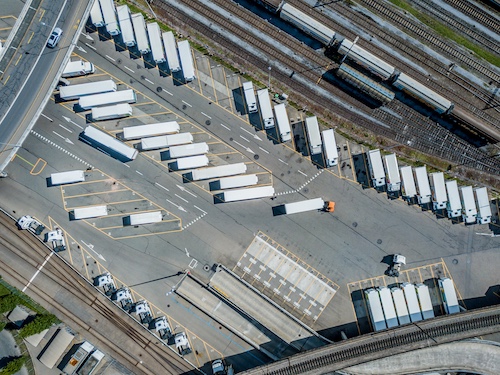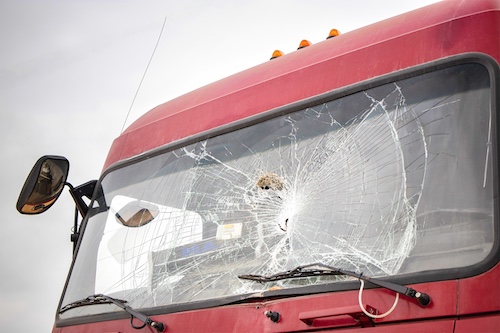Trucking Company Negligence and Your Right to Compensation
At 1Charlotte Personal Injury Lawyers, we stand up for victims of truck accidents and serious injuries. Our experienced Charlotte truck accident attorneys know how to prove trucking company negligence and fight for full compensation. We work on a contingency-fee basis, so you pay nothing unless we win. Contact our team today for trusted legal support and a free consultation.
Trucking company negligence can cause devastating accidents that leave victims with severe injuries, medical bills, and lost income. When a commercial truck crashes, the trucking company’s failure to follow safety regulations or hire qualified drivers often plays a major role. Understanding how to prove negligence is essential for anyone injured in a truck accident in North Carolina.
With help from an experienced Charlotte truck accident attorney, victims can hold negligent trucking companies accountable and pursue the fair compensation they deserve.
Understanding Liability in Trucking Accidents
Liability in a truck accident case depends on identifying who acted carelessly and how that carelessness caused harm. In North Carolina, both the truck driver and the trucking company can be held responsible when trucking company negligence leads to injury or loss.
Truck Drivers and Trucking Companies
Truck drivers must follow traffic laws and federal safety regulations. When a truck driver engages in reckless driving, distracted driving, or drives while fatigued, they can cause serious accidents. However, liability often extends beyond the individual driver. Trucking companies are responsible for the actions of their drivers when those drivers act within the scope of their employment.
Vicarious and Direct Liability
Vicarious liability makes a trucking company liable for its driver’s negligence. Direct liability applies when the trucking company itself behaves negligently. Common examples include negligent hiring practices, poor vehicle maintenance, and failure to provide adequate training. Both the driver and the trucking company may share fault if company negligence played a role in the crash.
North Carolina’s Contributory Negligence Rule
North Carolina follows the doctrine of contributory negligence. If an accident victim is even one percent at fault, they may be barred from recovering compensation. This rule makes it critical to build a strong case showing the trucking company’s negligence as the primary cause of the truck accident.
Statute of Limitations and Legal Duties
Under North Carolina General Statute § 1-52, truck accident victims generally have three years to file a personal injury lawsuit. Trucking companies must also comply with commercial vehicle laws under Chapter 20 of the North Carolina General Statutes and federal regulations set by the Federal Motor Carrier Safety Administration. Failure to meet these standards can make a trucking company liable for resulting damages.
Why Trucking Company Negligence Matters
Trucking companies control driver schedules, training programs, and vehicle upkeep. When a company fails in these areas, it puts everyone on the road at risk. Holding negligent trucking companies accountable helps accident victims pursue fair compensation and promotes safer practices across the trucking industry.
The Four Core Elements of Negligence and How They Apply to a Trucking Company
To prove trucking company negligence in a truck accident case, you must establish the four legal elements of negligence. Each element connects the trucking company’s actions to the injuries suffered by the accident victim.
Duty of Care
A trucking company owes a duty of care to the public. This duty includes hiring qualified commercial truck drivers, providing proper training, maintaining vehicles, and following all safety regulations. Under North Carolina General Statute § 20-37.12, trucking companies must ensure drivers hold valid commercial licenses. When a trucking company fails to meet these duties, it increases the risk of serious truck accidents.
Breach of Duty
A breach occurs when the trucking company fails to uphold its responsibilities. Common breaches include negligent hiring, inadequate training, poor vehicle maintenance, and ignoring driver fatigue. Companies that pressure drivers to exceed hours-of-service limits or overlook inspection requirements violate federal safety regulations. These failures demonstrate clear trucking company negligence.
Causation
Causation links the company’s breach of duty to the truck accident. If a truck’s brakes fail because the company skipped maintenance, or if driver fatigue causes a collision due to poor scheduling, the company’s actions directly led to the crash. Proving causation often requires expert analysis, maintenance records, and driver logs to show how the trucking company’s negligence caused harm.
Damages
The final element is damages. Truck accident victims must show that they suffered measurable losses from the trucking company’s negligence. These losses may include medical expenses, lost income, pain and suffering, and property damage. In severe cases involving catastrophic injuries, damages can extend to long-term care and reduced earning capacity.
Why Each Element Matters
Each element must be proven for a successful truck accident claim. A skilled Charlotte truck accident lawyer can collect evidence, apply state and federal laws, and demonstrate how the trucking company’s negligence caused the victim’s injuries. Establishing all four elements strengthens the case and supports fair compensation for accident victims.
Proving Trucking Company Negligence: Key Evidence & Investigation Steps
Proving trucking company negligence requires strong evidence and a careful investigation of every factor that caused the truck accident. Each step helps show how the trucking company’s actions or failures led to the crash.
Accident Scene Evidence
Evidence from the accident scene is critical. Photos, videos, and witness statements can show how the accident occurred. Investigators often collect skid mark data, vehicle damage reports, and debris patterns. Preserving this evidence early helps establish liability and prevent the trucking company or insurer from disputing facts later.
Driver Logs and Hours-of-Service Records
Commercial truck drivers must follow strict hours-of-service rules set by the Federal Motor Carrier Safety Administration. Reviewing electronic logging device (ELD) data and paper logs can reveal driver fatigue or violations. If a trucking company pressures drivers to exceed legal limits, this supports a claim of trucking company negligence.
Hiring and Training Records
Trucking companies must hire qualified drivers and provide adequate training. Reviewing employment files can uncover negligent hiring practices, such as hiring unqualified drivers or ignoring past safety violations. Training records can show whether the company provided proper instruction on safety procedures and federal regulations.
Vehicle Maintenance and Inspection Reports
Poor vehicle maintenance is a common cause of truck accidents. Maintenance logs, inspection reports, and repair invoices can reveal whether the company failed to keep its commercial trucks in safe condition. Missing records or ignored repair recommendations often indicate company negligence.
Cargo Loading Practices
Improper cargo loading can make a truck unstable and cause a rollover or jackknife. Bills of lading, cargo weight reports, and loading checklists help determine if the trucking company or its employees failed to follow safe loading procedures. Negligent loading practices can make the trucking company liable for the resulting accident.
Regulatory Violations
Violations of state or federal safety regulations can serve as evidence of negligence. North Carolina and FMCSA rules require commercial vehicles to meet strict safety standards. When a trucking company ignores these regulations, such as skipping inspections or falsifying records, it strengthens the case for liability.
Expert Testimony and Reconstruction
Accident reconstruction experts and trucking industry professionals can explain how company policies or mechanical failures led to the crash. Their reports help clarify technical details, such as brake failure or driver fatigue, that support a claim of trucking company negligence.
Role of a Charlotte Truck Accident Lawyer
An experienced Charlotte truck accident lawyer can identify key evidence, issue preservation requests, and work with experts to build a strong case. Legal representation ensures that accident victims have the resources to prove the trucking company was responsible and pursue fair compensation for their losses.
What Compensation Can Truck Accident Victims Seek
Accident victims who prove trucking company negligence may recover financial compensation for the losses they suffered. Understanding what damages are available helps victims know what to expect from a truck accident claim.
Economic Damages
Economic damages cover the measurable financial losses caused by the truck accident. These include medical expenses, rehabilitation costs, lost wages, and future loss of income. Victims may also recover the cost of repairing or replacing their vehicle. In severe truck accident cases, ongoing medical care or long-term therapy may be required, increasing the total value of the claim.
Non-Economic Damages
Non-economic damages account for the pain and suffering caused by the crash. Victims may experience emotional distress, anxiety, or reduced quality of life after a serious truck accident. A Charlotte truck accident attorney can help calculate these damages based on the severity of injuries and the long-term impact on the victim’s life.
Punitive Damages
In some cases, North Carolina courts may award punitive damages. These apply when a trucking company’s negligence involves reckless or intentional behavior, such as ignoring federal safety regulations or forcing drivers to exceed legal limits. Punitive damages serve as a warning to other negligent trucking companies to follow safety standards.
Proving Losses
Strong documentation is essential for proving losses. Medical records, pay stubs, tax documents, and repair estimates help establish the value of damages. An experienced attorney will gather this evidence and present it to insurance companies or the court to support the truck accident claim.
Speak With Our Team at 1Charlotte Personal Injury Lawyers ASAP!
If you or a loved one suffered injuries in a truck accident caused by trucking company negligence, you do not have to face the legal process alone. The team at 1Charlotte Personal Injury Lawyers has the experience and resources to investigate your case, prove liability, and fight for fair compensation. Our Charlotte truck accident attorneys understand how trucking companies and insurers operate, and we are committed to protecting your rights from start to finish.
Contact us at (704) 706-2689 for a free case consultation today!







